#ordained and established by God
Text

Unto Us a Child is Born
For unto us a child is born, unto us a son is given: and the government shall be upon his shoulder: and his name shall be called Pele-Yo’etz El Gibbor Avi-’Ad Sar-Shalom (Wonderful, Counselor, The Mighty God [The Powerful Living Word], The Father of eternity, The Prince of Peace).
Of the increase of [his] government and peace [there shall be] no end, upon the throne of David [beloved], and upon his kingdom, to order it, and to establish it with judgment and with justice from from this time forth (from now on) even forever. The zeal of the LORD-Yehōvah (Messiah Pre-Incarnate) Tz’va’ot [of the Heavenly Armies] will perform this.
— Isaiah 9:6-7 | New Messianic Version (NMV)
The New Messianic Version Bible by Tov Rose © 2012. All Rights Reserved.
Cross References: Matthew 1:1; Matthew 1:23; Matthew 28:18; Luke 1:32-33; Luke 2:11; John 3:16; John 12:34; Hebrews 7:24
#Jesus#birth#Christ child#titles#government#future ruler#peace#ordained and established by God#Isaiah 9:6-7#Book of Isaiah#Old Testament#NMV#New Messianic Version Bible
13 notes
·
View notes
Text
Today is All Saints Day, and I'm observing it in a somewhat unconventional manner: cyberbullying the Anglican Church in North America
The ACNA, if you're not familiar, is a group that splintered off from the Episcopal Church in 2009. The reason for the schism was that they believed TEC had "gone astray" by ordaining women priests and affirming LGBTQ people, so a bunch of conservative Episcopalians and clergy split off into their own group: the ACNA. They claim to be "continuing" Anglicans, representing the "real" Anglican tradition in the US and Canada.
The reason I'm cyberbullying them on All Saints Day is because they are conspicuously missing a lovely, pious, respectable, and orthodox Anglican saint: Saint Aelred of Rievaulx (1110-1167 CE)
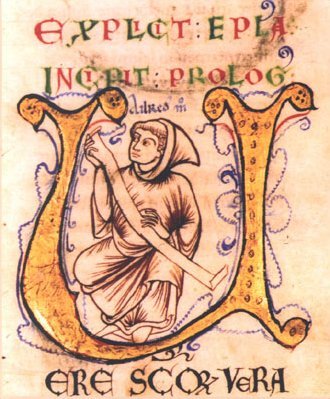
St. Aelred was a monk, abbot, historian, and spiritual writer from Northumbria. During his lifetime, the abbey boasted hundreds of monks and lay brothers, because Aelred was known for his friendly and gentle demeanor, wise leadership, and healthy community. He had the ear of kings and bishops all over northern Europe. He preached charity, humility, chastity, and all kinds of other Christian virtues. In short, he was the very model of a respectable medieval churchman.
He was also Very Much In Love With Men, and he wrote a treatise called "Spiritual Friendship," which might be nicknamed "How To Be In Love With Men In A God-Honoring Way." I've read it. It's wonderful and timeless and also very, very gay. He was in love with men. In a gay way.
Fast forward to the year 1980. Up until this point, St. Aelred had been a somewhat obscure local English saint. And then a groundbreaking new book was published which challenged all conventional narratives surrounding the Church and queer people in the Middle Ages: Christianity, Social Tolerance and Homosexuality by John Boswell. Boswell wrote at some length about Aelred and his love for men, drawing on his other work besides "Spiritual Friendship" and situating him into what was actually something of a "golden age" of gay culture in western Europe. Yes, really.
Fast forward again to the year 1985. At the Episcopal Church's general convention that year, members of Integrity USA (the original LGBTQ advocacy org in TEC) campaigned to have St. Aelred added to the calendar of saints. The House of Bishops agreed, and they added him to the church calendar with full knowledge that Aelred was gay.
Aelred was also physically disabled, and he wrote about his Spiritual Friend becoming "my hand, my eye, the staff of my old age": in other words, his Spiritual Friend was his caretaker as his health declined near the end of his life (which was still quite short even for a medieval person). He also describes the pain of his Spiritual Friend's early death in a way that remains tender 800 years later. I will leave you to imagine why that might be spiritually relevant to a bunch of nice church gays in 1985.
Fast forward again to 2009. The conservative wing of the Church has had enough of TEC's bleeding-heart liberal reforms, so they secede from the union leave and establish their own church without any icky queers or women priests. St. Aelred had been an official Episcopal saint for 25 years at that point, and the newly-formed ACNA had to consciously, deliberately choose to remove him from their calendar of saints.
Fast forward again to earlier this summer. I start doing research into queer Christian history and queer saints. I realize that Aelred is conspicuously missing from the ACNA's calendar, so I look into the background and decide to get obnoxious about it on Instagram. Because this is VERY embarrassing for a church that claims to be the "real" Anglican Church in North America.
A selection of memes for your enjoyment:
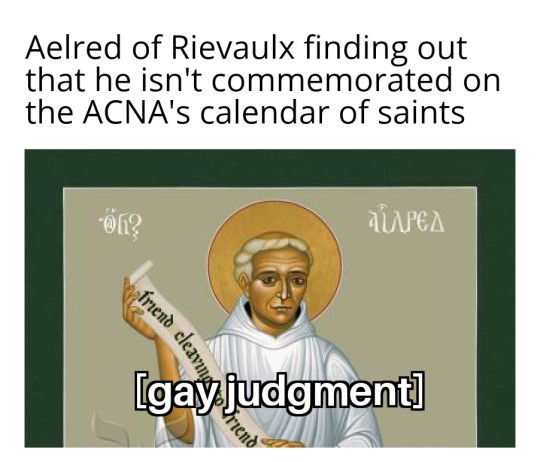
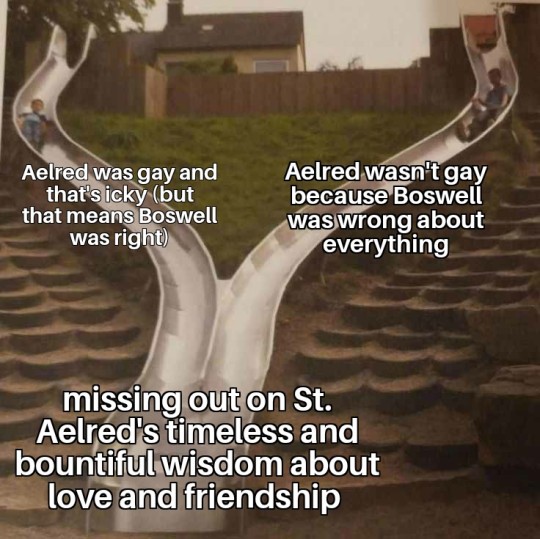

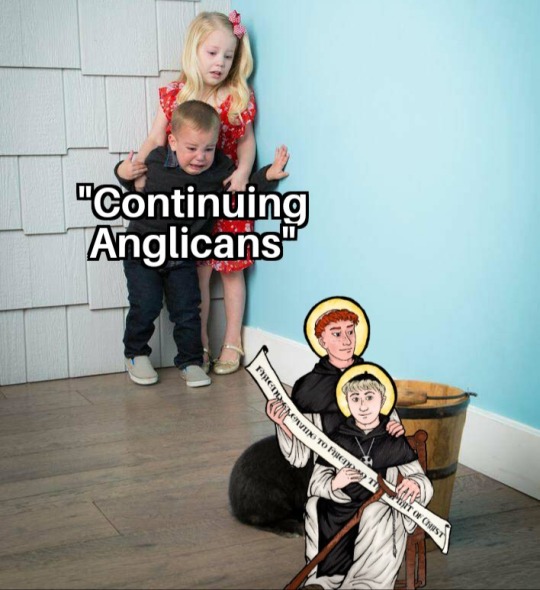
266 notes
·
View notes
Note
Lately all I can think of is TFP Optimus being demon bait. Amongst every iteration that I seen with the Matrix, he feels more like a placeholder involving the relic than an actual Champion for Primus. Plus TFP is the only one who doesn't retain any knowledge about his past as Orion Pax.
Placeholders are easier to tempt than champions since they aren't fully protected or warned of the danger. The Matrix of Leadership practically rats him out to anything supernatural when you consider it acts more like a vessel unlike other relics. Optimus is gonna have a mixed time should a demon hone in on him.
I get what you're saying. All the strange and, let's face it, very sus Artifacts are painting a very wild picture.
Personally, while I do believe TFP Optimus is a legitimate Prime, he isn't a fully realized one. It gets weirder with the Canon lore in the Aligned verse that the Matrix was housed with Prima's Star Saber and that Optimus is supposed to be the reincarnation of the mysterious Thirteen. Plus, Metroplex from the games vouched his status as a Prime: "Metroplex heeds the call of the last Prime." (Fall of Cybertron game)
I wonder how come the writers didn't go with the Primal Artifacts being semi-sentient? It would really make sense with the mythos and immense powers, especially since those tools can be only wielded by a Prime. So the building blocks were there. Or, have the ghost of Prima within the Matrix that's controlling new ordained champions, and it's intefering with Thirteen's connections? The Matrix has an established history of reformatting new bearers, so is it a big surprise that they're turned into Prima's thoughts of a prefect guardian? Prima has different Aspects and Domains compared to his youngest brother.
The themes of identity and self-determination are there. I think he internally struggled with it. Is he Orion Pax of Alpha Trion? Optimus Prime of Prima? Are they one and the same mask? Does he remember the Wilds in his dreams? Did he have hopes and plans for reconstruction? At night, does he recounts all the steps that brought him to that point?
But yeah, TFP!Optimus would be a succulent prize for a supernatural entity. The Matrix is both a beacon and lighthouse. To see a mortal God-King or a divine champion drowning in uncertainty would turn the very dangerous or very desperate towards him because a contract could be established.
Weirdly enough, out of all the Autobots, I think Optimus would have the easiest time navigating any potential entities. Orion Pax lived and breathed in doublespeak as an archivist directly sponsored by Alpha Trion himself. He knows the intricate dance to steer between treacherous allies and hostile enemies and how to be very leery of certain agreements. Orion was stuck between impossible contradictions of his status.
Ratchet has had certain privileges afforded by his function and frame. He's comfortable taking over things and saying his piece, especially among the current team. He also has a poor opinion of non-Cybertronian anything. He would either be killed for insolence and disrespect or be ensnared in a dream that gives him his deepest wishes. Arcee, depending on your viewpoint, is either lucky or unlucky, especially since she survives all her partnerships. Even Jack Darby, no matter how careful, has a human lifespan, which is seafoam to a Cybertronian. Something would latch onto her anger and grief. Bulkhead can be a very considerate soul. Some being would be charmed by the mech. Bumblebee is kind, and Smokescreen can be impulsive and so very clever. Traits that are endearing to many entities in old tales.
Optimus would have his hands full should something start sniffing around the base.
#ask#transformers#transformer prime#tfp#cybertronian culture#optimus prime#optimus#ratchet#arcee#bulkhead#bumblebee#smokescreen#prima#thirteen#gods and goddesses#analysis#tf headcanons#magic#fantasy#maccadam#my thoughts#man i got soooo many thoughts about Orion Pax of Alpha Trion and Optimus Prime of Prima#implied violence#i love Ratchet but my god he would piss off an entity so fucking fast that he would lucky to be dead#i have sad feels for arcee#and bulkhead deserves more love
50 notes
·
View notes
Text
Erotophobia And the Colonization of Queers/Nature


“The rhetoric and institution of Christianity, coupled with the imperialist drives of militarist nation-states, have been used for nearly two thousand years to portray heterosexuality, sexism, racism, classism, and the oppression of the natural world as divinely ordained” and though today’s Western industrialized world claims to be largely secular, these countries with Christian and colonial origins retain the ideology of divinely inspired domination” (122). “All eco feminists who have addressed the topic of spirituality, have observed that Christianity has been used as both an authorization and a mandate for the subordination of women, nature, person of color, animals and queers” (123).
Christianity originated as one cult among many in the Roman Empire—Christianity is then by its very inception, an urban religion. It appeared during a time of increasing militarization in the Roman state where stoic morality held chastity as ideal--with heterosexual intercourse allowed only for procreation within marriage; the belief was that procreation was the only legitimate reason for intercourse (Greenberg 1988, 219)(124). “To be like the angels was to be spiritual; to be carnal, unspiritual. Sex was the essence of carnality, hence the antithesis of spirituality” (1988, 224).
What distinguished Christianity from the many other ascetic cults of its time was the severity of its asceticism, its complete intolerance of other religions, and its high degree of organization aka hierarchy (124). Two accounts in Genesis have been used in Christianity to legitimize human/nonhuman hierarchy (human domination over nature, Genesis 1) and anthropocentrism (man as the center of creation, Gensis 2) (124). Moreover, the word ‘hierarchy’ itself means ‘holy order’. As Apostle Paul once said: “Let everyone obey the authorities that are over him, for there is no authority except from God, and all authority that exists is established by God”.
Christianity fit quite nicely with Roman state ideals, and it spread through the Roman military where eventually the cross was adopted as a military symbol and the Roman Empire became the Holy Roman Empire—the union of church and state as representing God’s will on earth was sealed.
“The inferiority and subordination of women, animals, the body, nature, the erotic, and all their associates was proclaimed by law, decreed by religion and relentlessly enforced” through violent assaults such as the Inquisition, the Crusades, the witch burnings and the ‘voyages of discovery’ (124).

#queer ecofeminism#ecofeminism#Christianity#erotophobia#torture#death#genocide#history#religion#roman empire#the roman empire#toward a queer ecofeminism
24 notes
·
View notes
Text
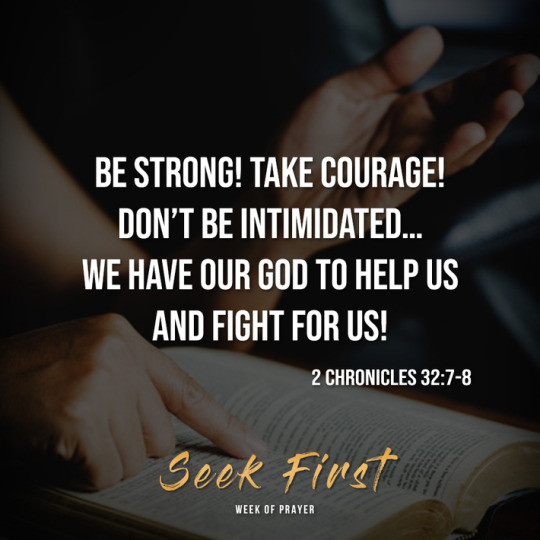
PERSEVERANCE FOR THE IMPOSSIBLE
As believers we are rooted and grounded in His magnificent love (see Ephesians 3:17). Because we are established in His love, we have a peace that passes all ordinary understanding. As we have a comprehension of our Christ identity, we have boldness and courage, the depth of which is confidence in the Lord. We cannot trust in our own reasoning. Instead, today we declare that we will, “Trust in the LORD with all [our] heart and lean not on [our] own understanding; in all [our] ways acknowledge Him, and He shall direct [our] paths” (Proverbs 3:5-6).
OUR DESTINY AWAITS
Through Him, peace is established deep within us, causing us to know beyond a shadow of a doubt that He will lead us and guide us. As we come to understand our Christ calling, He will lead us down the paths that He has DESTINED for our lives! This place of trust is beyond the natural ability of a person. It comes only through seeking His presence with a mindset of advancing His Kingdom that will bring to pass all that He has PURPOSED for us. This work of the Lord is unseen to us, as He is in our days ahead of us, dealing with adversaries of opposition and delays that would hinder us from the open doors and gates that He has pre-ordained for us so we can effectively bear fruit that remains for His advancing Kingdom.
"This one thing I do, forgetting those things which are behind, and reaching forth unto those things which are before, I press toward the mark for the prize of the high calling of God in Christ Jesus." - Philippians 3:13,14
Truly, the Lord will be strong on our behalf! This knowledge enables a courage deep within and causes us to be so anchored in seeking to understand and implement His purpose for our life so that our hearts and minds are steadfast. Thus, we will reach a place of focus that comes from being led by the Lord.
SUSTAINED BY FAITH
Our PERSEVERANCE must be innate and sustained by faith, not a product of self-determination. Holy PERSEVERANCE is God-empowered boldness or courage that enables us—deep within—to persevere in bearing fruit that remains for His Kingdom. One way we can define perseverance is simply “to stay the course.” This is a powerful blessing from the Lord that enables us to believe the impossible is possible. It is a work of the Holy Spirit within that enables us to have strength to stay the course, regardless of present circumstances or situations. This is what the prophet Isaiah wrote about:
"Fear not [there is nothing to fear], for I am with you; do not look around you in terror and be dismayed, for I am your God. I will strengthen and harden you to difficulties, yes, I will help you; yes, I will hold you up and retain you with My [victorious] right hand of rightness and justice." - Isaiah 41:10 AMP
In this passage, the Lord promises to be with us, to strengthen us, to keep us, and to hold us in a place of victory. The Hebrew meaning of the word "strengthen" is “to be strong, alert, courageous, brave, stout, bold, solid, and hard.” Here’s a more in-depth look:
"That He would grant you, according to the riches of His glory, to be strengthened with might by his Spirit in the inner man: that Christ may dwell in your hearts by faith; that you, being rooted and ground in love." - Ephesians 3:16,17
THE INCREDIBLE PROMISE:
We can stay the course because we grasp our Christ identity and the enabling strength of the Lord in us! We are strengthened deep within so that we stand firm for the promises of the Lord for our life. We lean into the Lord with deep courage to believe for the impossible to be possible.
ALBERT FINCH MINISTRY
37 notes
·
View notes
Text
Today we venerate Ancestor Bishop C.H. Mason on his 157th birthday 🎉
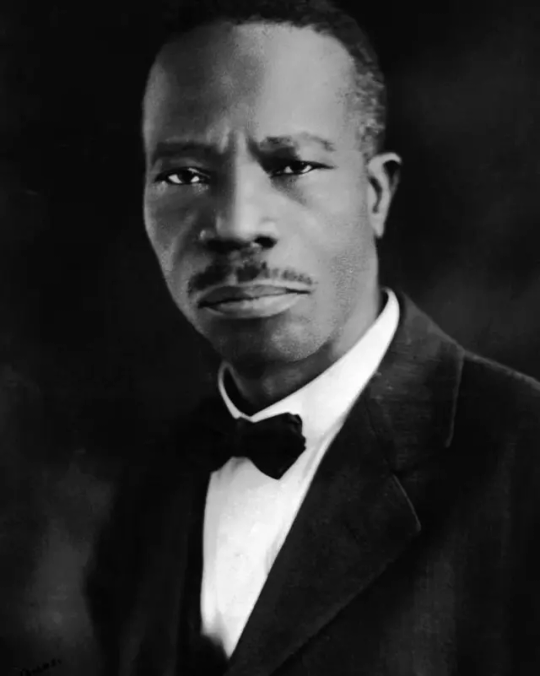
Bishop C.H. Mason founded the Church of God in Christ (COGIC), THE largest Black American pentecostal church in the U.S. In doing so, he preserved and cultivated the religious culturesof our Afrikan ancestors while fighting for ourreligious freedom of expression and integration in the church house.
Brother Mason born to former slaves in Shelby County, TN. Due to his family's impoverished status, young Mason worked as a sharecropper and did not receive a formal education. Yet he still learned how to read and write. As a child, Mason was greatly influenced by the religion of his parents and other former slaves. He admired their prayer rituals, spontaneous singing, & shouting. At age 12, he embraced the Afro-Baptist faith and was later baptized in his older brother’s church.
In 1895, Brother Mason met Charles Price Jones, a popular Baptist preacher from Mississippi. Mason and Jones started preaching the doctrine of holiness and sanctification together in local Baptist churches, which led to their expulsion from the Baptist & Methodist churches. They, and others, established the Church of God and Church of Christ. Their movement consisted of both Black and White folk were grossly dissatisfied with mainstream denominations. From COGIC’s inception, Brother Mason ordained and allowed whites to join his denomination. He dreamed of an integrated church and believed that all races were entitled to equal rights and authority therein. Their principal belief was that being sanctified was an internal experience that resulted in external changes within individuals & their communities. They taught their followers to seek higher spiritual development and encouraged them to rekindle the dynamism of "slave religion".
In 1897, Brother Mason established St. Paul COGIC in an old cotton gin located in Lexington, Mississippi. He then started using the name “Church of God in Christ”, because, "God told him that if he used that name it would cause people to follow him". By 1904, Brother Mason established pastoring 4 churches: St. Paul in Lexington, Saints Home and Dyson Street in Memphis, and a COGIC church in Conway, AR.
In 1907, he attended an interracial service in Los Angeles, CA. After which, he declared that he'd experienced a spiritual metamorphosis and that he now believed in speaking in tongues. This is what spurred Jones and others to excommunicate him from their Holiness association. This ultimately led to Brother Mason and Jones’s 12yr partnership ending over theological differences, rights to church properties, ecclesiastical power, and the COGIC name itself. After 3 years of legal battles, in 1911, Mason’s legal victories catapulted him into historical prominence and placed COGIC in the Mid-South’s religious pantheon.
Brother Mason was also an outspoken conscientious objector. He was arrested in 1918 and probed by the FBI for teaching pacifism and encouraging Brothas to refuse being drafted into WW I and II.
By the early 20th century, the Black Christian middle class frowned upon any & everything associated with Mother Africa. They believed shouting, dancing, & especially speaking in tongues, were shameful & hindered Black progress. Defiantly, Brother bMason encouraged his followers to embrace their Afrikan heritage and gave them space to express themselves in church. He allowed the working classes to dance shout, testify, speak in tongues, string musical instruments, & sing gospel. His preservation of the Afrikan heritage, freedom of religious expression, & leadership spearheaded COGIC’s astronomical growth.
In the 1920s, COGIC had 30K members &, as a result of the Great Migration, 68.7% percent worshiped in urban cities. By the 1930s, COGIC was an urban phenomenon. During the Great Depression, Brother Mason’s churches fed and clothed poor Whites and Black Peoples across Memphis
Today, it has an estimated 6.5 million members and 12,000 congregations. COGIC is the largest African American denomination in the United States, with eight million members worldwide.
We pour libations & give him💐 today as we celebrate him for his passion & commitment to the preservation & cultivation of our Central/West Afrikan cosmologies, cultures, & belief systems via our religious of expression.
‼️Note: offering suggestions are just that & strictly for veneration purposes only. Never attempt to conjure up any spirit or entity without proper divination/Mediumship counsel.‼️
Offering suggestions: COGIC bible/prayer offerings, water libations, gospel songs of praise/dance
.
.
.
#hoodooheritage #ATR #ATRs #hoodootradition #TheHoodooCalendar #ancestors #veneration #theblackchurch #ancestorveneration #bishopchmason #cogic #cogicchurch #og #deepsouth
#bishop ch mason#cogic#cogicchurch#black America#black Christians#ancestor elevation#ancestor#hoodoo#hoodoos#atr#the hoodoo calendar#atrs#conjure
23 notes
·
View notes
Text
triggered by the Amars calling succession to the Presidency by Cabinet officers, rather than the House Speaker, “apostolic succession”
the succession to Rome is by election of the College of Cardinals??? it doesn’t just go to the favorite of the last Pontifex???
sure, Christ picked the Apostles, and the Apostles picked the bishops for particular seats, cf. Tertull. Praescr. Haer. 32; Iren. Adv. Haer. 3.3.1, but ever since the proper succession to any particular seat has been by election
see, e.g., Jerome, Dialogue Against the Luciferians, ch. 11 (translated by Peter Norton, Episcopal Elections, 250–600: Hierarchy and Popular Will in Late Antiquity (Oxford, 2007), 5):
The truth is, the men who are elected to the episcopate come from the
bosom of Plato and Aristophanes. How many can you find among them who are not fully versed in these writers? Indeed everyone, whoever he may be,
is ordained at the present day from among the literate class and makes it his
study not how to seek out the marrow of Scripture, but how to tickle the ears
of the people with the flowers of rhetoric.
Cyprian, Ep. 55.8.4 (Norton 13):
Cornelius was made bishop by the
judgment of God and his Christ; by the testimony of almost all the
clergy; by the vote of all the people who were present [de plebis quae tunc adfuit suffragio],
and by the committee of senior bishops and good men.
cf. Cyprian, Ep. 67.3 (Norton 15):
the people definitely has the power either to choose worthy
bishops or to reject unworthy ones [quando ipsa <plebs> maxime habeat potestatem vel eligendi dignos
sacerdotes vel indignos recusandi]
Ambrose, Ep. 63.2 (Norton 13):
rightly it is believed that
he whom all have asked for [as bishop] is chosen by the judgment
of God [merito creditum quod divino esset electus iudicio, quem omnes postulavissent]
Apostolic Constitutions 8.4.2 (Norton 24):
and so, I, Peter say that a bishop to be ordained is to be, as we have all already
commanded, without blame in all respects; a chosen person, picked by the
whole people; and when he is named and approved, let the people assemble,
with the presbyters and bishops that are present, on the Lord’s day; and let
them give their consent. And let the principal of the bishops ask the presbytery and people whether this is the person whom they desire as their ruler.
And if they agree, let the bishop ask further whether he has a good testimony
from all men as to his worthiness for such a great and glorious authority;
whether all things relating to his piety towards God be right; whether justice
towards men has been observed by him; whether the affairs of his family
have been well-managed by him; whether he has been irreproachable in the
course of his life.
And if all the assembly together act according to truth, and
not according to prejudice, and witness that he is such a one, let them the
third time, as before God the Judge, and Christ, the Holy Ghost being also
present, as well as all the holy and ministering spirits, ask again whether he be
truly worthy of this ministry, so that in the mouth of two or three witnesses
every word may be established.
And if they agree the third time that he is
worthy, let all be asked for their vote; and when they all give it willingly, let
them be heard.
And then, after order has been called, being made, let one of
the principal bishops, together with two others, stand near together, the rest
of the bishops and presbyters praying silently, and the deacons holding the
divine Gospels open upon the head of him that is to be ordained.
Leo, Ep. 10.6 (Norton 38):
Let he
who is to be in charge of everybody be chosen by everybody. [Qui praefuturus omnibus est, ab omnibus eligatur.]
Leo, Ep. 14.5 (Norton 43):
When it comes to the choice of a bishop, let him be installed whom with
harmonious agreement the clergy and people have requested; and where
the votes of the parties are split among diVerent candidates, the future
bishop will be he who, in the metropolitan’s judgment, is more deserving
and has greater support, so that no bishop is ordained to those who do
not want him or who have not requested him; and so no city which is not
allowed to have the bishop it wanted will either despise or hate an
unwanted bishop, and become less pious than is proper.
[Cum ergo de summi sacerdotis electione tractabitur, ille omnibus praeponatur
quem cleri plebisque consensus concorditer postularit; ita ut si in aliam forte
personam partium se vota diviserit, metropolitani iudicio praefuturus qui
majoribus et studiis iuvatur et meritis: tantum ut nullus invitis et non petentibus ordinetur, ne civitas episcopum non optatum aut contemnerit aut oderit;
et fiat minus religiosa quam convenit, cui non licuerit habere quem voluit.]
Cod. Iust. 1.3.41 (Norton 34):
with this law we ordain that whenever
in any city there should be a vacancy for the bishop’s throne,
the inhabitants should make a resolution concerning three candidates, men of sound faith and pious habits . . .
so that from these the most suitable might be promoted to the
bishopric.
apparently Gratian helped kill the tradition by mangling a letter from Pope Celestine, dated 428. see Kenneth Pennington, The Golden Age of Episcopal Elections, 1100–1300, 35 Bull. Medieval Canon L. 243 (2017)
Celestine’s letter originally read:
No bishop should be given to an unwilling flock. The consent and desires of the clergy, laymen, and senate are required.
[Nullus invitis detur episcopus; cleri, plebis et ordinis consensus et desiderium requiratur.]
but Gratian edited that down to its final sentence, and extracted from it the black-letter rule that “the people don’t elect their bishop”:
The people do not elect [their bishop], but consent to the election.
[Plebi non est eligere, set electioni consentire.]
The consent and desires of the clergy and people are required.
[Cleri plebis consensus et desiderium requiratur.]
that isn't what it says, Gratian!
contra, e.g., Lumen Gentium 3.20–22, which reads the Fathers for all they’re worth and, not finding its own doctrine in them, cites to them with a “cf”, and even has the guff to cite the Apostolic Tradition (ca. 215), which reads, in Botte’s edition:
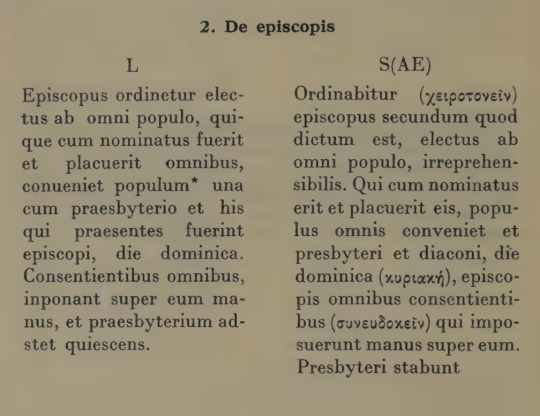
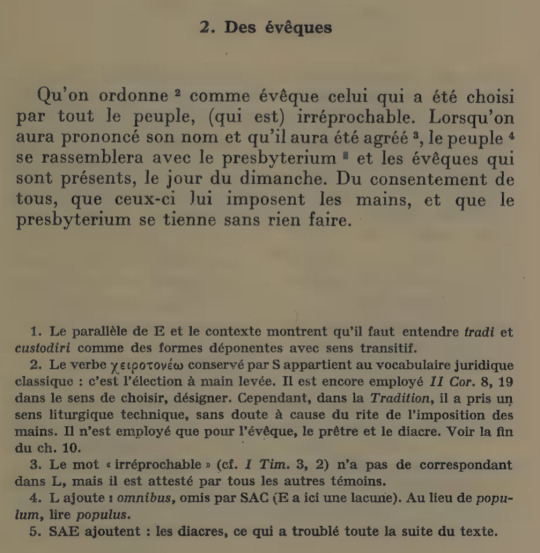
and in Dix’s edition:

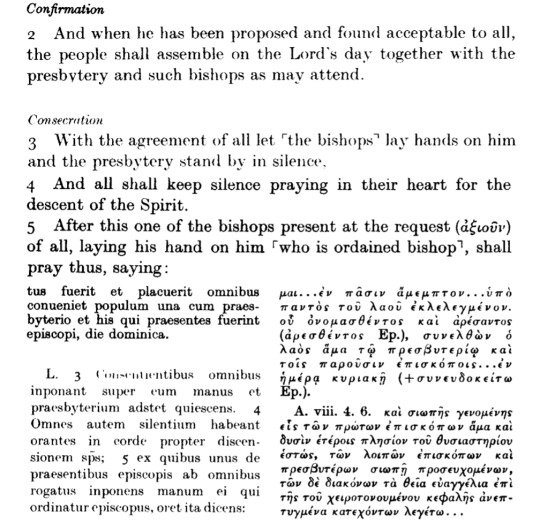
Romish guy, wise: “electus ab omni populo”? “consentientibus omnibus”? what could that possibly mean? ....... probably means the Pope picks them ......
it's an election, dumbass!
8 notes
·
View notes
Text
Family Matters
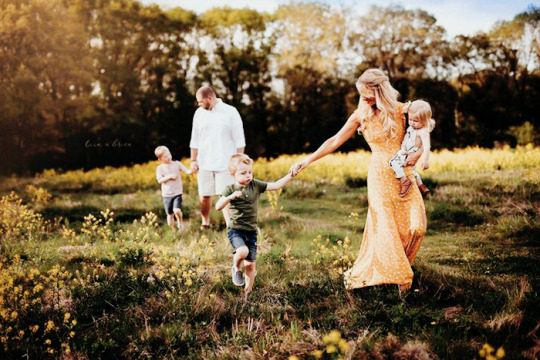
The Christian Family is a little church, a little government and a little society. It shapes the foundation of the church, and of society itself. Future generations depend on the leadership found in the home, and the values they receive there.
The Family is a God-ordained institution, a spiritual and organic unity, that was established for the cultural mandate of 1) glorifying the Creator, and 2) subduing the earth. In this mandate (Genesis 2) the duties of the husband, wife, children, masters and servants are encompassed, and the Scriptures readily set forth a theology of domestical duties. Husbands, wives and children have specific, God-honoring duties to perform in their respective stations in the economy of God’s redemptive plan. Their goal as a family is to 1) honor God, 2) edify the church and 3) promote Christian values in their respective stations of society. All this stems from the moral and spiritual values enumerated in the home and functioning to honor Christ Jesus. In this regard was the Puritan conception of the family or household. Dr. William Perkins described the family as a “little church”, Dr. William Gouge called it the “seminary of the Church and commonwealth…” and Rev. Richard Baxter characterized the home as “a church… a society of Christians combined for the better worshipping and serving God.” Rev. Lewis Bayly taught that “what the preacher is in the pulpit, the same the Christian householder is in his house.” He was quoting Augustine. The family, then, is the most important institution in society paralleling the relationship of Christ and the Church. Thus, Paul, carried by the Holy Spirit, rightly demonstrates this in Ephesians 5:22-6:9 in the manner of the duty of the husband, of the wife, of the children, and of masters and salves in the household.
Source: https://reformed.org/christian-family/
24 notes
·
View notes
Text
While men beat women at home, they ridiculed them in public. The jokes aimed at temperance women and "bloomer-girl" suffragists persist to our own day. They struck not just at avowed feminists, but at any woman who stepped out of her "wifely occupation." An 1860 cartoon in Vanity Fair depicted women salesclerks as "counter jumpers" in short hair and mustaches. And in 1866 a cartoon in Yankee Notions pictured a bestselling novelist "engaged in writing her last new sensational novel" while impatiently waving away a husband who holds a squalling baby, and ignoring three other screaming children. William Lloyd Garrison attributed this ridicule and derision of the women's rights movement not to "ignorance" but to "the natural out break of tyranny. . . . It is because the tyrants and usurpers are alarmed," he said. "They have been and are called to judgment, and they dread the examination and exposure of their position and character."
If men feared these women who refused to stay in their assigned sphere, they had as much to fear from the women who stayed at home. Those apparently domesticated women, deprived of all legal and political rights, were far more likely to resort to violence and men knew it. Wives might at least fight back. In Lawrence, Massachusetts, Patrick Doherty's wife pulled out a pistol to stop him from beating her with a stick; he swung anyway and hit the gun, which went off and killed him. Or women might as perhaps Mrs. Doherty actually did—take the offensive in the domestic battle. In Massachusetts in 1857, during debate over a legislative bill to grant a larger share of a man's estate to his surviving widow, an opposing senator argued that "wives were already too much disposed to rid themselves of their husbands." Citing several cases of women who allegedly murdered their husbands to get their property, he argued that increasing the widow's portion would only whet the wife's murderous inclinations. In the same year, in a remarkable sermon in defense of slavery, an Alabama minister described the typical wife's position: analogous to a slave's and, like it, ordained by God.
Your service is very, very, very often involuntary from the first, and, if voluntary at first becomes hopeless necessity afterwards. . . . the husband may not . . . love you. He may rule you with the rod of iron. What can you do? Be divorced? God forbid it, save for crime. Will you say that you are free, that you will go where you please, do as you please? Why ye dear wives, your husbands may forbid. And listen, you cannot leave New York, . . . not leave your parlor, nor your bedchamber, nor your couch, if your husband commands you to stay there. What can you do? Will you run away with your stick and your bundle? He can advertise you! What can you do? You can, and I fear some of you do, wish him, from the bottom of your hearts at the bottom of the Hudson.
Bathsheba Spooner, with the help of her friends, had wished her husband to the bottom of the well. But there were other, more subtle ways of shaking off the yoke, ways more appropriate to woman's domestic sphere. Woman was thought to be "fitted by nature to cheer the aflicted, elevate the depressed, minister to the wants of the feeble and diseased . . ." For the wife whose duty it was to cook the meals and nurse the ailing, what could be simpler than poison? First one case and then another was reported. As agitation for women's rights increased, men (and antifeminist women) shrilled that the traditional marriage relationship, established by God, would be destroyed. Women would no longer respect, serve, and obey their husbands. They might even turn against them, as indeed it seemed some women were doing in a direct, personal, sneaky, and lethal way. The rights of woman were at issue, but the fear of woman was never far from the surface of any debate. The poisoning wife became the specter of the century—the witch who lurked in woman's sphere and haunted the minds of men.
-Ann Jones, Women Who Kill
27 notes
·
View notes
Text
Saints&Reading: Wednesday, 13, March, 2024
march 1_march 29
VENERABLE JOHN CASSIAN THE ROMAN, ABBOT (435)

Saint John Cassian the Roman was born around 360, probably in Lesser Scythia (in Dacia Pontica). His pious Christian parents gave him an excellent classical education, and also instructed him in the Holy Scriptures and in the spiritual life.
Saint John entered a monastery in the diocese of Tomis, where his friend and relative Saint Germanus labored as an ascetic. In 380, desiring to venerate the Holy Places, Saint John went to Jerusalem with his sister and his friend Saint Germanus. The two monks stayed at a Bethlehem monastery, not far from where the Savior was born.
After five years at the monastery, Saints John and Germanus traveled through the Thebaid and the desert monasteries of Sketis for seven years, drawing upon the spiritual experience of countless ascetics. The Egyptian monks taught them many useful things about spiritual struggles, prayer, and humility. Like honeybees they journeyed from place to place, gathering the sweet nectar of spiritual wisdom. The notes Saint John made formed the basis of his book called CONFERENCES WITH THE FATHERS in twenty-four chapters.
Returning to Bethlehem for a brief time, the spiritual brothers lived for three years in complete solitude. Then they went back to Egypt and lived there until 399. Because of the disturbances caused by Archbishop Theophilus of Alexandria to the monasteries along the Nile, they decided to go to Constantinople, after hearing of the virtue and holiness of Saint John Chrysostom. The great hierarch ordained Saint John Cassian as a deacon and accepted him as a disciple. John and Germanus remained with Saint John Chrysostom for five years, learning many profitable things from him.
When Chrysostom was exiled from Constantinople in 404, Saints John Cassian and Germanus went to Rome to plead his case before Innocent I. Cassian was ordained to the holy priesthood in Rome, or perhaps later in Gaul. After Chrysostom’s death in 407, Saint John Cassian went to Massilia [Marseilles] in Gaul (now France). There he established two cenobitic monasteries in 415, one for men and another for women, based on the model of Eastern monasticism.
At the request of Bishop Castor of Aptia Julia (in southern Gaul), Cassian wrote THE INSTITUTES OF CENOBITIC LIFE (De Institutis Coenobiorum) in twelve books, describing the life of the Palestinian and Egyptian monks. Written between 417-419, the volume included four books describing the clothing of the monks of Palestine and Egypt, their schedule of prayer and services, and how new monks were received into the monasteries.The last eight books were devoted to the eight deadly sins and how to overcome them. Through his writings, Saint John Cassian provided Christians of the West with examples of cenobitic monasteries, and acquainted them with the asceticism of the Orthodox East.
Cassian speaks as a spiritual guide about the purpose of life, about attaining discernment, about renunciation of the world, about the passions of the flesh and spirit, about the hardships faced by the righteous, and about prayer.
Saint John Cassian also wrote CONFERENCES WITH THE FATHERS (Collationes Patrum) in twenty-four books in the form of conversations about the perfection of love, about purity, about God’s help, about understanding Scripture, about the gifts of God, about friendship, about the use of language, about the four levels of monasticism, about the solitary life and cenobitic life, about repentance, about fasting, about nightly meditations, and about spiritual mortification. This last has the explanatory title “I do what I do not want to do.”
Books 1-10 of the CONFERENCES describe Saint John’s conversations with the Fathers of Sketis between 393-399. Books 11-17 relate conversations with the Fathers of Panephysis, and the last seven books are devoted to conversations with monks from the region of Diolkos.
In 431 Saint John Cassian wrote his final work, ON THE INCARNATION OF THE LORD, AGAINST NESTORIUS (De Incarnationem Domini Contra Nestorium). In seven books he opposed the heresy, citing many Eastern and Western teachers to support his arguments.
In his works, Saint John Cassian was grounded in the spiritual experience of the ascetics, and criticized the abstract reasoning of Saint Augustine (June 15). Saint John said that “grace is defended less adequately by pompous words and loquacious contention, dialectic syllogisms and the eloquence of Cicero (i.e. Augustine), than by the example of the Egyptian ascetics.” In the words of Saint John of the Ladder (March 30), “great Cassian reasons loftily and excellently.” His writings are also praised in the Rule of Saint Benedict.
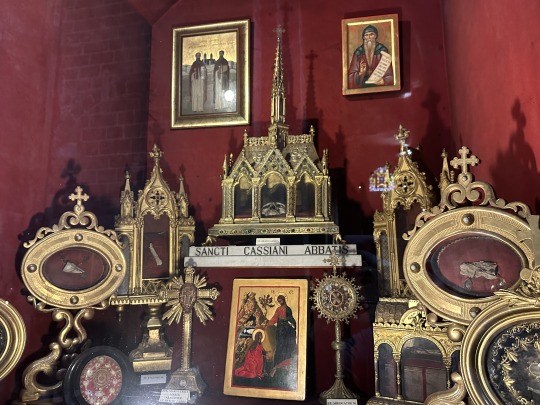
St John Cassian relics in the main Church of St Victor Abbaye in Marseille France.
Saint John Cassian lived in the West for many years, but his spiritual homeland was the Orthodox East. He fell asleep in the Lord in the year 435. His holy relics rest in an underground chapel in the Monastery of Saint Victor in Marseilles. His head and right hand are in the main church.
THE MONK LEO, CAPPADOCIAN MONASTIC

Saint Leo of Cappadocia fulfilled the commandment to love his neighbor by suggesting to the Saracens, who had captured three sickly monks, that he take the place of these infirm captives with himself, since he was healthy and able to work.
While journeying in the desert, Saint Leo weakened and was not able to go any farther. He was beheaded with the sword, thereby laying down his life for his neighbor.
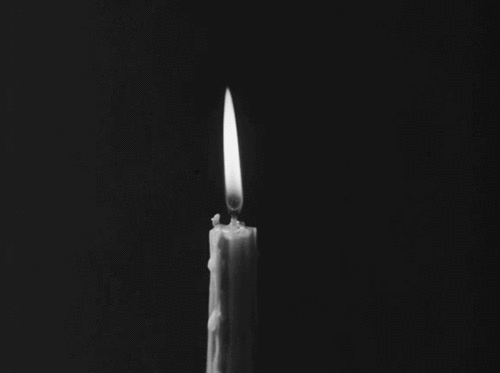
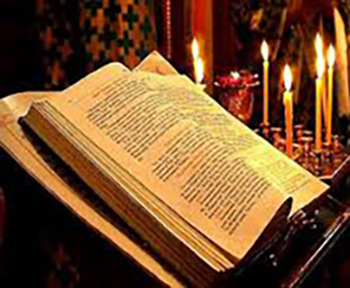
JOEL 2:12-26
12 Now, therefore, says the Lord, Turn to Me with all your heart, With fasting, with weeping, and with mourning. 13 So rend your heart, and not your garments; Return to the Lord your God, For He is gracious and merciful, Slow to anger, and of great kindness; And He relents from doing harm. 14 Who knows if He will turn and relent, And leave a blessing behind Him-- A grain offering and a drink offering For the Lord your God? 15 Blow the trumpet in Zion, Consecrate a fast, Call a sacred assembly; 16 Gather the people, Sanctify the congregation, Assemble the elders, Gather the children and nursing babes; Let the bridegroom go out from his chamber, And the bride from her dressing room. 17 Let the priests, who minister to the Lord, Weep between the porch and the altar; Let them say, "Spare Your people, O Lord, And do not give Your heritage to reproach, That the nations should rule over them. Why should they say among the peoples, 'Where is their God?' " 18 Then the Lord will be zealous for His land, And pity His people. 19 The Lord will answer and say to His people, "Behold, I will send you grain and new wine and oil, And you will be satisfied by them; I will no longer make you a reproach among the nations. 20 But I will remove far from you the northern army, And will drive him away into a barren and desolate land, With his face toward the eastern sea And his back toward the western sea; His stench will come up, And his foul odor will rise, Because he has done monstrous things. 21 Fear not, O land; Be glad and rejoice, For the Lord has done marvelous things! 22 Do not be afraid, you beasts of the field; For the open pastures are springing up, And the tree bears its fruit; The fig tree and the vine yield their strength. 23 Be glad then, you children of Zion, And rejoice in the Lord your God; For He has given you the former rain faithfully, And He will cause the rain to come down for you-- The former rain, And the latter rain in the first month. 24 The threshing floors shall be full of wheat, And the vats shall overflow with new wine and oil. 25 So I will restore to you the years that the swarming locust has eaten, The crawling locust, The consuming locust, And the chewing locust, My great army which I sent among you. You shall eat in plenty and be satisfied, And praise the name of the Lord your God, Who has dealt wondrously with you; And My people shall never be put to shame. Then you shall know that I am in the midst of Israel: I am the Lord your God And there is no other. My people shall never be put to shame. And it shall come to pass afterward That I will pour out My Spirit on all flesh; Your sons and your daughters shall prophesy, Your old men shall dream dreams, Your young men shall see visions. 26 You shall eat in plenty and be satisfied, And praise the name of the Lord your God, Who has dealt wondrously with you; And My people shall never be put to shame.
#orthodoxy#orthodoxchristianity#easternorthodoxchurch#originofchristianity#spirituality#holyscriptures#bible#saints
5 notes
·
View notes
Text
“The manipulation of nature, which we deplore today where our environment is concerned, now becomes man’s fundamental choice where he himself is concerned. From now on there is only the abstract human being, who chooses for himself what his nature is to be. Man and woman in their created state as complementary versions of what it means to be human are disputed. But if there is no pre-ordained duality of man and woman in creation, then neither is the family any longer a reality established by creation. Likewise, the child has lost the place he had occupied hitherto and the dignity pertaining to him. Bernheim shows that now, perforce, from being a subject of rights, the child has become an object to which people have a right and which they have a right to obtain.
When the freedom to be creative becomes the freedom to create oneself, then necessarily the Maker himself is denied and ultimately man too is stripped of his dignity as a creature of God, as the image of God at the core of his being. The defence of the family is about man himself. And it becomes clear that when God is denied, human dignity also disappears. Whoever defends God is defending man.”
— Pope Benedict XVI (21/Dec/2012)
33 notes
·
View notes
Text
SAINT OF THE DAY (January 31)
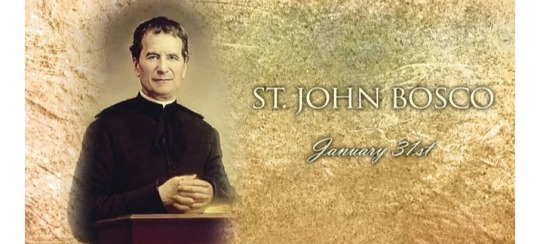
On January 31, the Roman Catholic Church honors St. John Bosco (or “Don Bosco”), a 19th-century Italian priest who reached out to young people to remedy their lack of education, opportunities, and faith.
John Bosco was born on 16 August 1815 to a family of peasant farmers in Castelnuovo d'Asti — a place which would one day be renamed in the saint's honor as “Castelnuovo Don Bosco.”
John's father died when he was two years old, but he drew strength from his mother Margherita's deep faith in God.
Margherita also taught her son the importance of charity, using portions of her own modest means to support those in even greater need.
John desired to pass on to his own young friends the example of Christian discipleship that he learned from his mother.
At age nine, he had a prophetic dream in which a number of unruly young boys were uttering words of blasphemy.
Jesus Christ and the Virgin Mary appeared to John in the dream, saying he would bring such youths to God through the virtues of humility and charity.
Later on, this dream would help John to discern his calling as a priest.
But he also sought to follow the advice of Jesus and Mary while still a boy:
He would entertain his peers with juggling, acrobatics and magic tricks, before explaining a sermon he had heard, or leading them in praying the Rosary.
John's older brother Anthony opposed his plan to be a priest and antagonized him so much that he left home to become a farm worker at age 12.
After moving back home three years later, John worked in various trades and finished school in order to attend seminary.
In 1841, John Bosco was ordained a priest.
In the city of Turin, he began ministering to boys and young men who lived on the streets, many of whom were without work or education.
The industrial revolution had drawn large numbers of people into the city to look for work that was frequently grueling and sometimes scarce.
Don Bosco was shocked to see how many boys ended up in prison before the age of 18, left to starve spiritually and sometimes physically.
The priest was determined to save as many young people as he could from a life of degradation.
He established a group known as the Oratory of St. Francis de Sales and became a kindly spiritual father to boys in need.
His aging mother helped support the project in its early years.
John's boyhood dream came to pass:
He became a spiritual guide and provider along with his fellow Salesian priests and brothers, giving boys religious instruction, lodging, education, and work opportunities.
He also helped Saint Mary Dominic Mazzarello form a similar group for girls.
This success did not come easily, as the priest struggled to find reliable accommodations and support for his ambitious apostolate.
Italy's nationalist movement made life difficult for religious orders, and its anti-clerical attitudes even led to assassination attempts against Don Bosco.
But such hostility did not stop the Salesians from expanding in Europe and beyond.
They were helping 130,000 children in 250 houses by the end of Don Bosco's life.
“I have done nothing by myself,” he stated, saying "it was Our Lady who has done everything through her intercession with God."
John Bosco died in the early hours of 31 January 1888, after conveying a message:
“Tell the boys that I shall be waiting for them all in Paradise.”
Pius XI beatified him on 2 June 1929 and canonized on 1 April 1934.
He is a patron saint of young people, apprentices, and Catholic publishers and editors.
6 notes
·
View notes
Note
how old were u when u left orthodoxy?
Hi anon,
The short version is that although I am a convert (not raised in orthodoxy) I left orthodoxy multiple times. The first was in my early 20s when I left my orthodox community and the second was when I left my all-but-orthodox ‘trad egal’ community in my mid-20s. Both of these communities were strict and chauvinistic even though the second was supposedly more progressive. Most orthodox or orthodox-adjacent communities have strong elements of religious Zionism (the idea that the modern state of Israel is God-ordained), just as most Jewish communities in the USA are Zionist to some degree.
I’m taking this as an excuse to answer “why did you leave orthodoxy?” even though you didn’t ask that.
If you’d like a longer explanation and more background, especially if you’re not from this part of the Jewish world, see below. Note that I am very critical of orthodoxy and its satellite communities.
Short background: Modern orthodox Judaism seeks to be orthodox in the modern world–secular education is allowed (unlike in ultra-orthodoxy). While modern orthodoxy is moving rightward politically and religiously, modern orthodoxy definitely remains (see Rabbis Marc Angel, Jonathan Sacks, etc.) Halachic/trad egal are very similar movements somewhere between orthodoxy and conservative/masorti Judaism, which follow similar stringencies to orthodoxy, but which allow for more women’s participation. There are claims I can't directly disprove that some trad egal communities are basically Reform in their social politics but are more observant re: dietary laws and shabbat or so I'm told. But that’s not the rule across the board and was not the case in the second community I left.
It’s not uncommon for “left wing” modern orthodox communities to take a “harm reduction” approach to people leaving orthodoxy. Many orthodox practices are still encouraged even if someone leaves this very small but still extant branch of modern orthodoxy, and which trad/halachic egal communities often still embody, if only because their membership is largely former-orthodox Jews who haven’t deconstructed their issues and Jews who are insecure and need structure/in-group identity. Examples:
Keeping kosher and keeping shabbat (simple enough, but often functions to keep people from making non-Jewish friends because no time/can't share food)
In a similar way, not engaging in much interfaith work or relationships. This is often done both through emphasizing the importance of ritual observance as well as stoking fears of antisemitism.
Identifying with orthodoxy as a label–it’s a hard emotional bond to sever. I identified as “orthodox-adjacent” even after I stopped attending an orthodox synagogue.
Encouraging conformity: this often emphasizes not being visibly queer, or barring that, being more visibly Jewish to “compensate” because otherwise (horror of horrors) they might “look secular” by not looking straight/cis. (This is separate from the obsession with being “seen as Jewish” you see on Jumblr, but that’s too much to unpack here.)
General Jewish Chauvinism (on a spectrum of spelling “xtianity”, saying “Yoshke” instead of “Jesus” to overt racism). Instead of being framed as “leaving orthodoxy” it’s framed as “assimilation” if you’re not a particular kind of Jewish.
Zionism: ideally religious zionism because it’s harder to deconstruct something that’s both a religious and political belief, but support for Israel is encouraged both because the orthodox establishment does, but also because it keeps people in. If you think anyone who doesn’t support Israel is an anti-semite, that keeps you isolated.
The Internalized Orthodox Gaze™ (not my term but it’s excellent). This is the idea that all Judaism should be measured by orthodoxy. Not only are there many variants within orthodoxy, it fundamentally prevents people from self-theologizing because they always refer back to orthodoxy for approval.
Anyway, these are all things you see in both orthodoxy and orthodox-adjacent communities.
I don’t know who you are, anon, but if you like data, this survey on people leaving modern orthodoxy is very interesting. It was conducted by an orthodox Jewish org, but in this case it provides background that liberal Jewish or non-Jewish researchers might not think to ask: http://nishmaresearch.com/assets/pdf/Report_Modern_Orthodox_Survey_of_Those_Who_Have_Left_Nishma_Research_July_2016.pdf
Thanks for asking!
#i#otd#ex orthodox#judaism#atheism#me and religion#not an atheist myself but ppl who track that tag may find this interesting#anon#ask
3 notes
·
View notes
Note
Hey! I’m a teenager, and I’m in a weird place in my life with my morals and such. I grew up Christian and I do believe in God, but I’ve been stuck on my opinions towards the lgbtq+ community. I have a gay uncle who has a boyfriend and is 100% Christian. Long story short, I never saw being gay as “unnatural”, “weird”, or “sin” until someone said to me that it was. I even have a lot of lgbtq+ friends and I love and support them, so when people push that being gay is a sin it really confuses me.
I never saw it that as bad and I don’t believe that they would be born that way if it was truly a sin, but then again, I wonder what’s really true and what isn’t. I obviously love people no matter their race, sex, or sexual preference, but the anti-gay agenda that conservatives push really confuses me especially because me and some of my Christian family members have “leftist values”, like being pro-choice. Any thoughts?…
If you are asking "why" homophobia exists within certain Christian theologies... I don't really think I am capable of explaining concisely nor eloquently. I simply have too many thoughts about the matter. I could go into biblical exegesis or doctrinal discussions for hours. However, I will share with you some of my broader thoughts.
I was having conversation with a straight friend the other day about what is central to homophobic ideology. We spoke about how there are two understandings of homosexuality within homophobic theologies. One paradigm is that homosexuality does not arise naturally but rather a symptom of suffering or just an purposeful act of deviation. It is a sin, simply put. The other posits homosexuality as naturally occurring, but "intrinsically disordered," which means that gay people will always be outside of the holy ordained model of heterosexuality even if they naturally are homosexual.
In both views, public forms of homosexuality are deemed threatening to the current established order of heterosexuality. It disrupts seemingly stable ordering of existence of heterosexual society. It disrupts gender roles and hierarchy. This is why there is an effort to purposefully marginalize LGBT people. If LGBT people are effectively marginalized (and ideally forgotten about), then the heterosexual ordering remains supreme.
There is a diversity of Christian thought when it comes to LGBT people. It is rarer to find openly homophobic Christians when looking at the broader Church. It is much more common to find subtle homophobia... which in some ways can be just as dangerous.
Christian understandings of sexuality have always been diverse and changing. The topic of homosexuality just happens to be the main focus of the church right now. Who knows where the zeitgeist might be 100 years down the line.
I was reading this old-ish article a while back by this Jesuit, and I really enjoyed it. You might like reading it too. It really highlights some of the discussions the Catholic Church has been having about the nature of homosexuality.
66 notes
·
View notes
Text
World building and theories of Engage
Pandreo's outfit
Pandreo's name in Japanese is Pandoro and he is named after the Italian sweetbread of the same name. Pandoro cake is traditionally shaped like a frustum with an eight pointed star section. I wonder if his unique hairstyle was inspired by the shape of the desert. In Italian pandoro translates to golden bread, again I wonder if his golden eye colour was inspired by this.
His starting class is high priest and his outfit is inspired by his holy occupation. His religious vestments consist of his alb, in Western Christian Churches the garment symbolises the priest's role as a servant of Christ, it could represent Pandreo's role as a servant of the Divine Dragon. The stole over his shoulders could indicate his state of ordained office as well as serving practical purposes such as being wrapped over the face to protect from the desert conditions.
He wears a colour way of orange, navy and grey/white. In the Bible orange represents purification and fire while navy symbolises heaven and the word of God. Orange and blue are also colours associated with Sicily's navy.
There is a ‘badge’ with three rhombus shapes upon it. The shape resembles a diamond and could symbolise perfection, immortality and indestructibility. In the Bible there are passages around man being ‘a diamond in the rough’, which means that man has exceptional hidden potential. The rhombus has four straight, equal sides with each equal side being parallel. Symmetry is a very important theme in Engage with several character's journeys mirroring each other.
His outfit is designed to be the yin to the tang of his sister's outfit. At the front of his vestments are the symbols of crosses, a symbol of faith whereas Panette has bows, a non religious symbol, upon her dress. His vestments are light, symbolising the day and Panette’s dress is dark, symbolising the night. Pandreo wears symbols of life such as the cross, the rhombus and fire while Panette wears symbols associated with the day of the dead. Pandreo‘s vestments represent the establishment and Panette's dress represents rebellion.
3 notes
·
View notes
Text
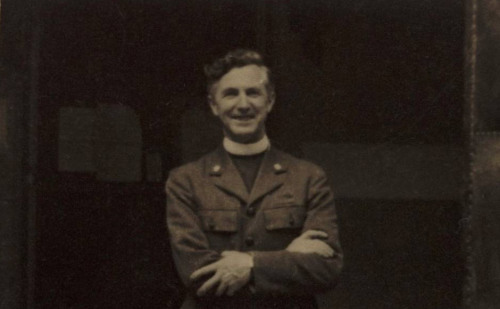
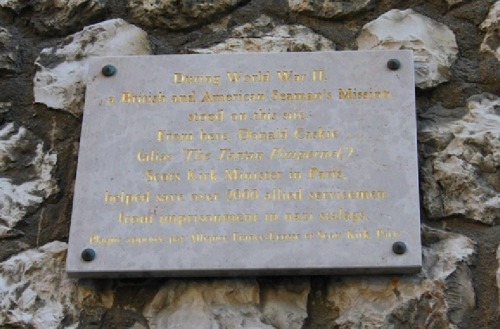
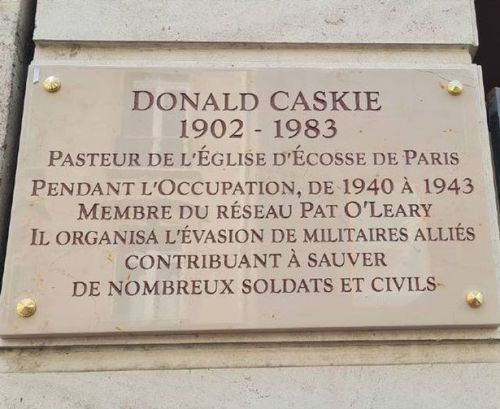
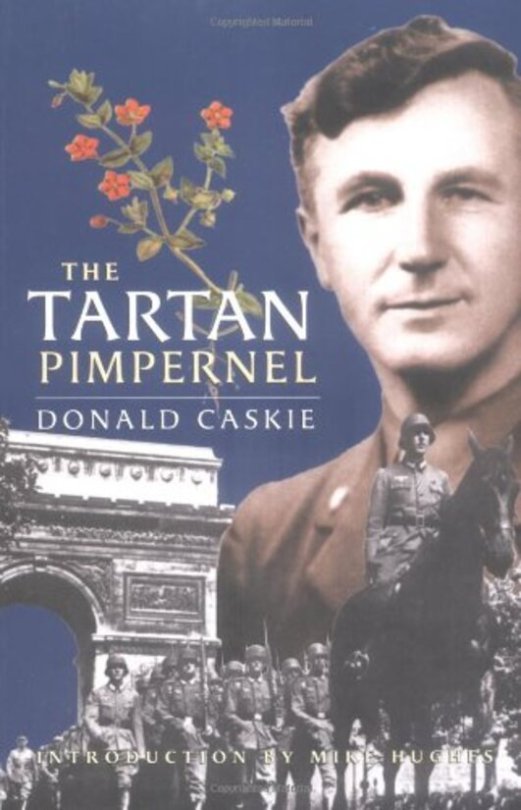
Donald Currie Caskie was born on May 22nd 1902 at Bowmore, Islay, his exploits during WWII earned him the nickname “The Tartan Pimpernel"
The son of a crofter he was educated at Bowmore School and then Dunoon Grammar School Donald then graduated from the University of Edinburgh and from New College in 1928, with a higher degree, a doctorate, in Divinity. Further studies – and some travels – followed, he was licensed to preach and ordained to the ministry of the Church of Scotland in 1932 and became a minister, his first Kirk was at Gretna before being sent to the Scots Kirk in Paris in 1938.
A small congregation of the Church of Scotland had existed in the French capital since 1858, acquiring in 1885 the building in the Rue Bayard formerly used by the American Episcopal Church. The Kirk has a connection to another famous Scot the athlete and missionary, Eric Liddell preached there in 1924. Wishing to observe the Sabbath, he had refused to run that day.
Dr. Caskie did not hesitate to attack from his pulpit the Nazi regime in Germany, where Adolf Hitler had attained supreme power as Chancellor in January 1933. As Hitler’s policies and plans became ever more aggressive and extreme – with talk of racial hatred and Germany’s supposed right to extend its borders at the expense of its neighbours, Lebensraum – Caskie became more outspoken in his condemnation.
As the prospect of war loomed Donald Caskie felt a duty to remain in France, rendering such help as he could.Ultimately he reached Marseilles – Marseille. Here the Scottish minister opened the British Seamen’s Mission, ostensibly a simple place of shelter and spiritual support, but from the start Caskie had always intended to give assistance of a more tangible and substantial kind.
Those seeking help usually arrived under cover of darkness – cold, hungry, often wounded, for the Mission was to become the last link in a chain of ‘safe houses’, refuges, for escaping Allied servicemen that stretched all the way to Dunkirk in the north. When a man was well enough, and after Donald had said a prayer for him, he would be guided across the Pyrenees to neutral Spain and ultimately to Gibraltar, from where he might return to Britain to rejoin the forces.
Donald Caskie went on to help orchestrate the safe return of around 2,000 Allied soldiers and airmen trapped in occupied France by establishing a network of safe houses and escape routes – despite facing the constant threat of capture and execution.
At Marseilles, Caskie was under constant surveillance from the Vichy police; everywhere he went, he felt he was followed. The house itself was frequently raided. He had to be ultra-careful – ‘canny’ is the Scots word. “My only armour was the grace of God,” he wrote. His first duty towards each new arrival was to hide him, at least until such time as ‘papers’ of some sort could be obtained.
Dr. Donald Caskie’s dangerous and clandestine work at Marseilles had continued for almost a year before he was suddenly arrested.
Convicted on scant evidence of helping Allied servicemen, Donald received only a suspended sentence. Banished from Marseilles, he was directed to Grenoble where his high academic qualifications allowed him to take up a post in the department of English at the university. Grenoble was the ‘intellectual centre’ of opposition to the Nazis and many students were deeply committed to the Resistance. He did not cease to be active in his wider mission of rescue. The Scottish minister knew many people – many who might be able to assist – and seemed to have a talent for making new friends; he has been described as a consummate ‘networker’, 50 years before this modern term was coined.
The name of the last man whom Dr. Caskie helped to rescue while at Grenoble – Mr. William Nash, a fellow Scot from Whitburn, West Lothian. It was April 1943. In just a few days Donald Caskie was to find himself again under arrest, but this time his situation would be altogether more serious. Returning to his accommodation one evening, he switched on the light to find himself confronted by five men of the Nazi Gestapo. Seized at gunpoint, he was arrested, interrogated and sentenced to death at a Nazi show trial but survived when a German pastor intervened.
Caskie was transferred to the Caserne St. Denis, a regular prisoner-of-war camp rather than a high-security prison, where the men eagerly awaited the end of hostilities. Donald’s joy at the liberation of Paris was ecstatic. “My happiness can only be imagined,” he wrote, “it cannot be described.”
Dr. Donald Caskie returned to Scotland in 1960. His last charge was at Monkton, close to Prestwick Airport, from which he retired in 1968 due to failing health. He died on 27th December 1983. Donald had not married, and is interred with his parents in the graveyard of Kilarrow Church at Bowmore, Islay.
A true heroic Scottish figure, he is remembered with plaques in Marseille and Paris as seen in the pics.
If you want to know more about this little known Scottish war hero there is a ten minute video from The People’s History Show on YouTube here
youtube
11 notes
·
View notes